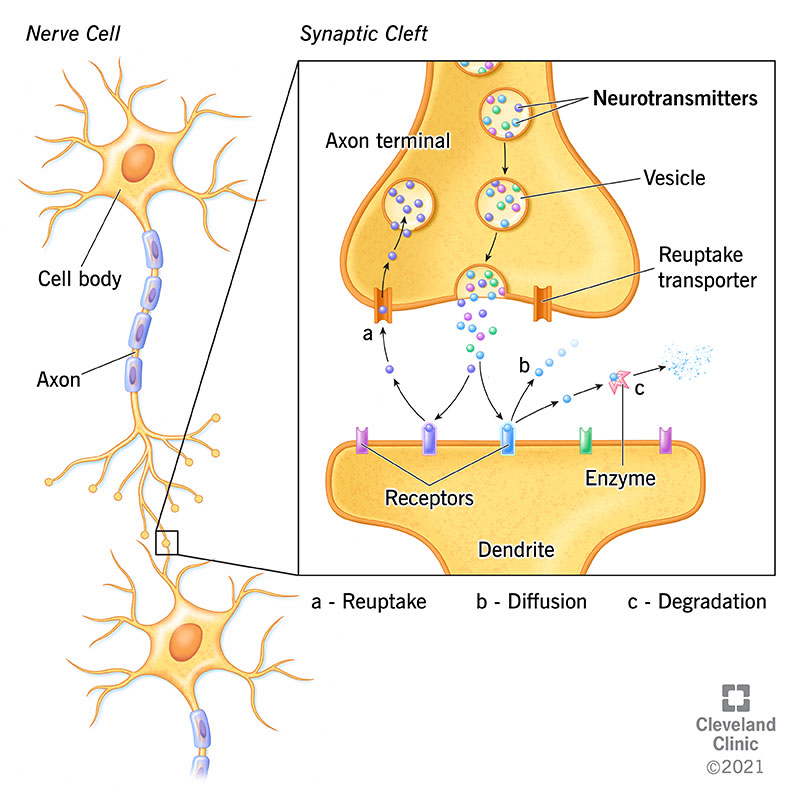
Neurotransmitters are the unsung heroes of the human brain, serving as the vital messengers that facilitate communication between neurons (nerve cells). These chemical compounds play a pivotal role in the complex world of neuroscience, influencing our thoughts, emotions, behaviors, and even our bodily functions. In this comprehensive article, we will explore the fascinating world of neurotransmitters, delving into their functions, types, regulation, and their profound impact on the human mind and body.
The Basics of Neurotransmitters
At the heart of neurotransmitters lies their role as chemical messengers within the brain and nervous system. They are responsible for transmitting signals from one neuron to another, enabling the flow of information that underpins all brain functions.
Neurons: The Building Blocks of the Nervous System
Before diving into neurotransmitters, it’s crucial to understand neurons. Neurons are specialized cells that make up the nervous system. They consist of a cell body, dendrites (which receive signals), and an axon (which transmits signals). Neurons communicate with each other via synapses, which are tiny gaps where neurotransmitters are released.
Synaptic Transmission: The Neurotransmitter’s Journey
The process of synaptic transmission involves several key steps:
- Synthesis: Neurotransmitters are synthesized in the cell body of neurons.
- Storage: They are stored in vesicles (tiny sacs) within the neuron’s axon terminals.
- Release: When an electrical signal (action potential) travels down the neuron, it reaches the axon terminal, causing neurotransmitters to be released into the synaptic cleft (the gap between neurons).
- Binding: Neurotransmitters bind to receptors on the neighboring neuron’s dendrites.
- Effect: This binding either excites or inhibits the postsynaptic neuron, influencing whether or not it will transmit the signal further.
Types of Neurotransmitters
There are numerous neurotransmitters in the human brain, each with its unique functions and effects on behavior and physiology. Here are some of the most well-known neurotransmitters:
1. Dopamine: The Reward Molecule
Dopamine is often associated with pleasure, reward, and motivation. It plays a significant role in addiction, mood regulation, and movement control. Dysregulation of dopamine is linked to conditions like Parkinson’s disease and schizophrenia.
2. Serotonin: The Mood Stabilizer
Serotonin is involved in mood regulation, sleep, appetite, and social behavior. It is a target for many antidepressant medications. Low serotonin levels are associated with depression and anxiety disorders.
3. Acetylcholine: The Learning and Memory Messenger
Acetylcholine is crucial for learning, memory, and muscle contractions. It’s also involved in the regulation of the autonomic nervous system, which controls involuntary bodily functions.
4. GABA (Gamma-Aminobutyric Acid): The Calming Influence
GABA is the primary inhibitory neurotransmitter, meaning it reduces the activity of neurons. It plays a role in reducing anxiety and promoting relaxation. Medications like benzodiazepines target the GABA system.
5. Glutamate: The Excitatory Driver
Glutamate is the most abundant excitatory neurotransmitter in the brain. It’s essential for cognitive functions, learning, and memory. However, excessive glutamate activity can be neurotoxic and is associated with conditions like Alzheimer’s disease.
6. Norepinephrine (Noradrenaline): The Fight-or-Flight Signal
Norepinephrine is involved in the body’s “fight-or-flight” response. It affects alertness, arousal, and attention. Dysregulation of norepinephrine is associated with conditions like anxiety and post-traumatic stress disorder (PTSD).
Regulation of Neurotransmitters
The precise balance of neurotransmitters in the brain is essential for optimal brain function. Various factors influence neurotransmitter levels, including genetics, diet, lifestyle, and medications. Imbalances in neurotransmitters can lead to mental health disorders, such as depression, anxiety, and schizophrenia.
Neurotransmitter Reuptake and Degradation
After transmitting their signals, neurotransmitters are either reabsorbed by the presynaptic neuron (reuptake) or broken down by enzymes. Medications like selective serotonin reuptake inhibitors (SSRIs) work by blocking the reuptake of serotonin, increasing its availability in the synapse.
Conclusion
Neurotransmitters are the unsung heroes of the brain, orchestrating the intricate dance of signals that drive our thoughts, feelings, and actions. Understanding these chemical messengers provides valuable insights into the functioning of the human brain and the complex nature of mental health and neurological disorders.
As research in neuroscience continues to advance, our knowledge of neurotransmitters and their roles in the mind and body deepens. This growing understanding opens doors to new treatments and therapies for various neurological and psychiatric conditions, offering hope for improved mental health and a better quality of life for millions of individuals around the world.





